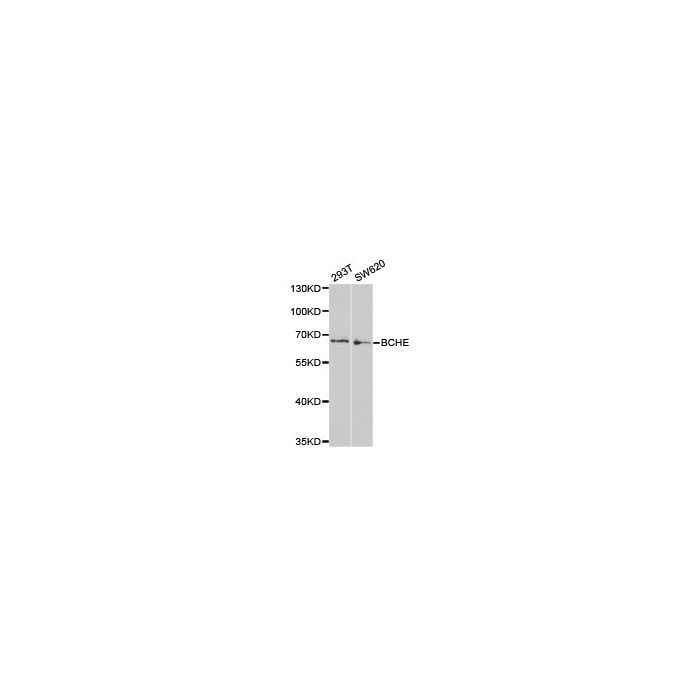BCHE polyclonal, anti-human, mouse, rat
€388.00
In stock
SKU
BS6965
Background:
Present in most cells except erythrocytes, butyrylcholine esterase (BChE), also designated acylcholine acylhydrolase or pseudocholinesterase, has esterase activity as well as aryl acylamidase activity. It hydrolyzes acylcholine into choline and carboxylate. BChE is synthesized in the liver and is highly reactive with organophosphate esters. BChE can form a homotetramer composed of two dimers linked by a disulfide bond. Defects in the gene encoding BChE are associated with the disease hypocholinesterasemia. Inhibition of BChE effects the toxicity of organophosphates in the respiratory system suggesting that BChE may play a role in respiratory function. In addition, BChE may play an important pharmocological role by hydrolyzing toxic esters. This suggests an involvement of BChE in a treatment for intoxication with substances such as cocaine.
Alternative Name:
Cholinesterase, Acylcholine acylhydrolase, Butyrylcholine esterase, Choline esterase II, Pseudocholinesterase, BCHE, CHE1, Butyrylcholinesterase
Application Dilution: WB: 1:500 - 1:2000, IHC: 1:50 - 1:200, IF: 1:50 - 1:200
Specificity: BCHE polyclonal antibody detects endogenous levels of Cholinesterase protein.
Immunogen:
Recombinant full length Human BCHE.
MW: ~ 68 kDa
Swis Prot.: P06276
Purification & Purity:
The antibody was affinity-purified from rabbit antiserum by affinity-chromatography using epitope-specific immunogen and the purity is > 95% (by SDS-PAGE).
Format:
1 mg/ml in Phosphate buffered saline (PBS) with 0.05% sodium azide, approx. pH 7.2.
Storage:
Store at 4°C short term. Aliquot and store at -20°C long term. Avoid freeze-thaw cycles.
For research use only, not for use in diagnostic procedure.
Present in most cells except erythrocytes, butyrylcholine esterase (BChE), also designated acylcholine acylhydrolase or pseudocholinesterase, has esterase activity as well as aryl acylamidase activity. It hydrolyzes acylcholine into choline and carboxylate. BChE is synthesized in the liver and is highly reactive with organophosphate esters. BChE can form a homotetramer composed of two dimers linked by a disulfide bond. Defects in the gene encoding BChE are associated with the disease hypocholinesterasemia. Inhibition of BChE effects the toxicity of organophosphates in the respiratory system suggesting that BChE may play a role in respiratory function. In addition, BChE may play an important pharmocological role by hydrolyzing toxic esters. This suggests an involvement of BChE in a treatment for intoxication with substances such as cocaine.
Alternative Name:
Cholinesterase, Acylcholine acylhydrolase, Butyrylcholine esterase, Choline esterase II, Pseudocholinesterase, BCHE, CHE1, Butyrylcholinesterase
Application Dilution: WB: 1:500 - 1:2000, IHC: 1:50 - 1:200, IF: 1:50 - 1:200
Specificity: BCHE polyclonal antibody detects endogenous levels of Cholinesterase protein.
Immunogen:
Recombinant full length Human BCHE.
MW: ~ 68 kDa
Swis Prot.: P06276
Purification & Purity:
The antibody was affinity-purified from rabbit antiserum by affinity-chromatography using epitope-specific immunogen and the purity is > 95% (by SDS-PAGE).
Format:
1 mg/ml in Phosphate buffered saline (PBS) with 0.05% sodium azide, approx. pH 7.2.
Storage:
Store at 4°C short term. Aliquot and store at -20°C long term. Avoid freeze-thaw cycles.
For research use only, not for use in diagnostic procedure.
| Is Featured? | No |
|---|
Write Your Own Review

